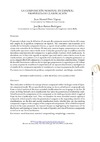Please use this identifier to cite or link to this item:
https://accedacris.ulpgc.es/jspui/handle/10553/70668
| Title: | La composición nominal en español propuesta de clasificación | Other Titles: | Spanish compounding: a new proposal of classification | Authors: | Pérez Vigaray, Juan Manuel Batista Rodríguez, José Juan |
UNESCO Clasification: | 550510 Filología | Keywords: | Modern Greek History Word Formation Nominal Compounding Morphology, et al |
Issue Date: | 2020 | Journal: | Revista de Filología de la Universidad de La Laguna | Abstract: | El presente trabajo trata de delimitar el concepto de compuesto nominal dentro del campo más amplio de las palabras compuestas en español. Nos centramos concretamente en el estudio de los llamados compuestos léxicos, y, a partir de un análisis crítico de las clasificaciones más conocidas de los últimos 30 años para nuestra lengua, proponemos una nueva clasificación que toma como criterio rector la relación gramatical que se establece entre los miembros constituyentes del compuesto y se aplica desde el primer nivel clasificatorio. Se abandona, así, la línea más seguida en español, que suele tomar como criterio rector de sus clasificaciones, en el primer y en el segundo nivel clasificatorio, la categoría gramatical, ya sea la categoría final del compuesto o la categoría de los elementos constituyentes. Después de describir brevemente cada uno de los tipos que proponemos, la segunda parte del trabajo se centra en poner de manifiesto la importancia de los aspectos diacrónicos y tipológicos en el estudio de los compuestos españoles (y románicos) y en nuestra propuesta de clasificación This study aims to delimit the concept of noun compound within the largest realm of Spanish compound words. We are specifically focusing on the so called lexical compounds and, from a critical analysis of the most extended classifications for our language in the last 30 years, we bring forward a new classification that takes the grammatical relationship established between the components of the compound as the leading criterion which is applied from the first classification level. Thus, we abandon the most extended research approach in Spanish, which usually takes the grammatical category as the organizing criterion of its classifications, on the first and second classification levels, whether they are the resulting compound category or the category of the compound components. After a brief description of each of the types presented, the research focuses on highlighting the importance of the diachronic and typological issues in the study of Spanish, and also of Romance compounds as well as in our own classification. |
URI: | https://accedacris.ulpgc.es/handle/10553/70668 | ISSN: | 0212-4130 | DOI: | 10.25145/j.refiull.2020.40.11 | Source: | Revista de Filología de la Universidad de La Laguna [ISSN 0212-4130], n. 40, p. 205-245 |
| Appears in Collections: | Artículos |
WEB OF SCIENCETM
Citations
1
checked on Mar 1, 2026
Page view(s) 5
104
checked on Jan 10, 2026
Download(s)
105
checked on Jan 10, 2026
Google ScholarTM
Check
Altmetric
Share
Export metadata
Items in accedaCRIS are protected by copyright, with all rights reserved, unless otherwise indicated.
